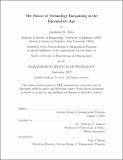The Future of Technology Bargaining in the Information Age
Author(s)
Atto, Anthony R.
DownloadThesis PDF (1.387Mb)
Advisor
Ashford, Nicholas A.
Terms of use
Metadata
Show full item recordAbstract
This thesis was motivated by the advent of digital technologies and their effects on workers. Using technology as a substitute for labor is a common industrial practice and the effects of substitution (though not the decision to substitute) will continue to dominate collective bargaining in the information age.
More relevant than substitution is the effect that digital technologies are having on the production process itself. It is becoming `taskified' and `digitized.' Decomposed into smaller, well-defined tasks that are also digitally compatible with each other, the entire production process is becoming easier to direct, control, and monitor. Each new task presents management a new lever of power in two forms -- the decision to substitute and the ability to monitor.
While substitution of technology for labor remains an issue, the complementarity of labor and technology contributions in the production process is becoming more important; apportioning value created to a factor in the production process is especially complicated and subjective with large numbers of complementary tasks.
The need for labor education is amplified by these factors and argues for a renewed interest in technology bargaining. A policy examination from various labor-related organizations and informant discussions suggest that labor recognizes this and is responding accordingly. Bargaining agreements have data and technology clauses, `digital union representatives' are being hired, and education on digital technologies is being prioritized.
Keywords: Complementarity, Decision bargaining, Effects bargaining, Industrial relations, Labor education, Labor substitution, Power, Production process, Taskification, Technology bargaining, Worker monitoring
Date issued
2022-09Department
System Design and Management Program.Publisher
Massachusetts Institute of Technology